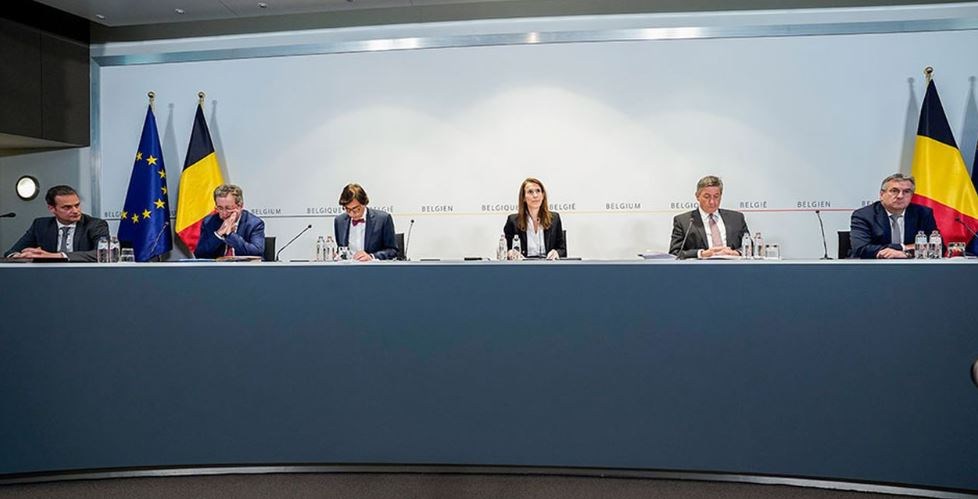Belgium will lift its lockdown, imposed to contain the further spread of the new coronavirus (Covid-19) in several phases, announced Prime Minister Sophie Wilmès during a press conference on Friday.
The Group of Experts for an Exit Strategy (GEES), which has to ease the country out of the lockdown, handed over its report of recommendations, of which two previous versions leaked to the press this week, to the government.
"Relaxing the measures is only possible if we continue to respect the basic rules of social distance and hand hygiene," said inter-federal Covid-19 spokesperson Steven Van Gucht on Friday morning.
Following a meeting with Belgium’s National Security Council joined by the country regions’ Minister-Presidents as well as several politicians from the federal government, Wilmès announced the country's next stage in its lockdown measures, based on the GEES' recommendations.
The transition between phases will be monitored, and based on a number of criteria, including the spread of the virus, the number of hospital admissions and the saturation of intensive care beds. The transition of the phases will be confirmed at the latest one week before the date of transition.
"This is not definitive. We can never rule out the possibility that we will have to take a step back if the virus flares up again," Wilmès said.
Masks will play a key role in the phasing out strategies. Therefore, it is strongly recommended that they are always used in public spaces, but especially when the physical distance cannot be guaranteed. The government will provide at least one free mask for every citizen.
The testing capacity in Belgium will be scaled up to 25,000-30,000 PCR tests per day by 4 May. If necessary, the number of tests can still be increased to 45,000 per day.
Phase 1A: 4 May
Companies: There will be a gradual return to work. Companies that cannot guarantee social distancing have to take measures. Telework remains the norm.
Stores: Fabric stores are allowed to open, to provide fabric for masks.
Social gathering: Cycling or going for a walk as a group of three will also be allowed. Social distance has to be respected at all times. Gatherings and meeting friends at home remain prohibited.
Sports: Some sports played in pairs and in the open air, such as kayaking and tennis, will be allowed again, without physical contact. Locker rooms and cafeterias will remain closed.
Public transport: Public transport will resume its usual activities, but the use of face masks is mandatory. During all phases of the lockdown, people are recommended to move by their own means in order to make room on public transport for the people who need it most.
Phase 1B: 11 May
Stores: All stores are allowed to reopen, on very strict conditions, which will be defined next week, in agreement with the GEES.
Three types of conditions will be discussed with the sector: work organisation, welcoming customers, and limiting access to the shops to avoid too many people at the same time.
Jobs involving close contact, such as hairdressers, cannot be restarted yet.
Phase 2: 18 May
Bars, cafés, restaurants will not be allowed to open yet.
Reopening museums, subject to conditions, will be considered.
Marriages and funerals can, after evaluation, take place in slightly larger groups, and the possibility of gatherings at home is still being studied too.
Day-trips (including to second residences) within Belgium can be considered, and outdoor physical activities can be extended to more than 2 people, after evaluation.
However, the focus of this phase is education. The start date is 18 May, but pilot projects can already be organised on 15 May.
Nursery school: lessons will be suspended until the end of May, and likely restart at the beginning of June.
Primary and secondary school: lessons will be restarted for a maximum of 3 grades, in smaller groups of 10 pupils per class, and a minimum of 4 square metres per pupil must be provided.
Schools will continue to be responsible for the care of children whose parents have to work. Fabric face masks will become mandatory for teachers and children older than 12. Regularly washing hands will be mandatory, and supervised.
Phase 3: 8 June, at the earliest
Restaurants and cafes can likely be gradually reopened, after a positive evaluation.
Youth movement camps and summer internships will be decided at the end of May. Travelling, both within the country and abroad, will still be studied, as well as the reopening of tourist attractions and smaller open-air events.
Festivals and mass events are still cancelled until at least 31 August.
Contact tracing
An inter-federal committee will be in charge of testing and tracing, which will ensure a coordinated strategy between regions and communities, with the support of federal experts.
When people show symptoms of being infected, they should go to the doctor and be tested. When it turns out that they have the coronavirus, the data of who they have been in contact with for the past two weeks, will be passed on to a contact tracing centre. Those people will then be contacted. This will start from the first phase of the phasing out.
"The exit strategy will go into force from 4 May, after which we have a long period of transition ahead of us, before we can regain our freedoms and go back to normal life," Wilmès said.
"The efforts we are making, are paying off. They are not for nothing. In order to succeed, we count on your sense of responsibility, on your sense of citizenship, on your common sense," Wilmès said. "We will undeniably come out of this ordeal stronger. As always, take good care of yourself, and take care of others," she added.
Update: This story has been updated with additional information following the end of the press conference on Friday 24 April.
Maïthé Chini
The Brussels Times

